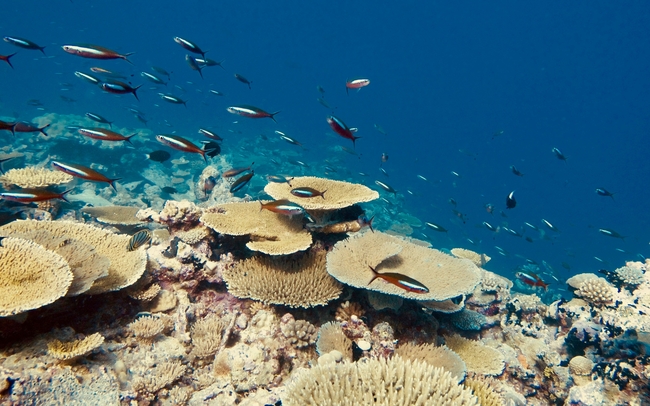08/02/2022 | A new study by the working group Geoecology and Carbonate Sedimentology at ZMT has looked at the topic of ecosystem design and for the first time investigated what possibilities this concept, developed by ZMT mangrove ecologist Prof. Dr. Martin Zimmer, offers to support central functions of tropical reef systems. In our interview series "Research Compact", Dr. Marleen Stuhr reports on the results.
What is ecosystem design?
Marleen Stuhr: The concept of ecosystem design focuses on human needs for specific ecosystem services. The design and (re)construction of degraded habitats is about targeted interventions that meet these specific needs. The concept was originally developed for mangrove ecosystems to provide an alternative to traditional approaches to ecosystem conservation or restoration, which often involve reduced human use.
By considering and planning for human use in ecosystem design, ecosystems can already be robustly 'designed' and thus protected from later disturbance by human use. In addition, projected impacts of climate change are planned for instead of reconstructing ecosystems which existed under previous climatic conditions. The concept combines resilience with sustainability and forward-planning for climate adaptation, and ideally offsets intervention costs with economic benefits.
What is the study about?
Marleen Stuhr: The concept of ecosystem design is a controversial idea. Our publication extends this discussion from mangrove ecosystems to coral reefs, as coral reefs and other tropical marine habitats worldwide are highly threatened by global climate change and local pollution. The formation of calcareous skeletons, e.g. by corals or foraminifera, is a fundamental prerequisite for the formation and stability of reef islands and beaches or for coastal protection. In addition, coral reefs and other marine habitats such as seagrass beds or calcifying algae habitats contribute significantly to food production, CO2 sequestration and tourism.
From a conceptual perspective, we outline and discuss what opportunities ecosystem design offers to support key functions of tropical carbonate deposition systems. We wanted to find out whether the ecosystem design approach can pioneer sustainable development of tropical coasts. With this study, we hope to provide some food for thought and actively contribute to the discussion on ecosystem design and the potential implementation of the concept in different tropical coastal systems.

Dr. Marleen Stuhr in Eilat | Photo: Stephanie Helber, ZMT
How did you go about it?
Marleen Stuhr: Our conceptual perspective study is based on published literature. As ecosystem design is a new, innovative and controversial approach conceptualised by Prof. Martin Zimmer, Head of Mangrove Ecology at the ZMT, and has never been applied before to carbonate deposition systems and reefs, we first relied on a synthesis of the literature on ecosystem design in mangroves. Furthermore, we have added publications on restoration and conservation of carbonate depositional systems, especially coral reefs, to our review.
What does this mean in exactly?
Marleen Stuhr: We discuss the potential application of ecosystem design to endangered, degraded tropical coral reefs and related habitats. Calcium carbonate habitats formed by ecosystem engineers such as scleractinian corals, calcifying green algae and large foraminifera provide valuable ecosystem services to millions of people worldwide. We focus services on shoreline protection and conservation, atoll island resilience to sea level rise, food resources, tourism and climate.
With a geological view of time-dependent dynamics, we draw on our knowledge of past environmental changes such as sea-level fluctuations during carbonate deposition. We want to understand how future ecosystem design efforts can maintain these functions in future climate change scenarios.
What did you conclude?
Marleen Stuhr: Careful implementation of ecosystem design approaches in carbonate deposition systems could help atoll islands adapt to sea level rise or manage the erosion impacts of coastal structures. It is important that, in line with the core idea of ecosystem design, careful assessments are made that represent a balanced approach to maximising ecosystem services (e.g. carbonate production) while recognising and avoiding potential damage to existing functioning ecosystems.
What is the societal relevance of ecosystem design?
Marleen Stuhr: The sustainable use of coastal ecosystems and their services is essential for millions of people living along tropical coasts, especially in the face of climate change and overexploitation. Conserving ecosystems through conventional measures often excludes human use, which in turn is difficult to reconcile with the fact that marine habitats such as coral reefs are usually also the livelihoods of local people. Transferring such approaches to other ecosystems (besides mangroves or carbonate deposition systems) could thus be of great importance for the population and decision-makers in tropical coastal regions.
Ecosystem design is discussed quite controversially – what do you tell critics?
Marleen Stuhr: At its core, ecosystem design is a knowledge-based approach to managing socio-ecological systems that focuses on maintaining ecosystem services without compromising the natural functions of the ecosystem. An important consideration for such an approach is therefore what services can be usefully extracted from an ecosystem and whether the current needs of the local population can continue to be met while maintaining ecosystem functions.
Clearly, a high degree of knowledge about the effects and side effects of such interventions is required, combined with ethical discussions especially about any introduction of alien or manipulated species. Therefore, the implementation of ecosystem design must be accompanied by an open and informed discussion about possible consequential damage, sufferers, trade-offs and ethics. The knowledge gaps we have identified need to be addressed to enable informed decision-making.
Publication:
Hildegard Westphal, Gary N. Murphy, Steve S. Doo, Thomas Mann, Alexander Petrovic, Christiane Schmidt, Marleen Stuhr (2022) Ecosystem design as an avenue for improving services provided by carbonate producing marine ecosystems; PeerJ 10:e12785





